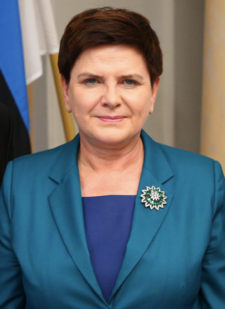Lucinda Kielska
Lucinda Kielska | |
|---|---|
 Photo of Lucinda Kielska in 2070 | |
| State Minister from Eskimone | |
| Assumed office 2070 | |
| Preceded by | Robert Schlesinger |
| 7th Chairman of the Libertist Party | |
| In office 2061–2070 | |
| Preceded by | Walter Boudreau |
| Succeeded by | Adler Schmidt |
| 5th Minister of International Relations | |
| In office 2053–2061 | |
| President | Eli Dupont Santiago Franco |
| Preceded by | Patrick Murphy |
| Succeeded by | Grigory Guschin |
| State Delegate from Eskimone's 3rd District | |
| In office 2046–2053 | |
| Preceded by | Joshua Yap |
| Succeeded by | Katherine Egbert |
| Personal details | |
| Born | Lucinda Kielska 2016 (age 57) |
| Nationality | Icarisian |
| Political party | Libertist (until 2076) Independent (2076-present) |
| Profession | Politician |
| Military service | |
| Allegiance | Icaris |
| Branch/service | Icarisian Navy |
| Years of service | 2034-2035 |
Lucinda Kielska (b. 2016)
Contents
Early life and childhood
Political career
Political views
| Policy | Large/Small | Yes/No | High/Low | Easy/Rigid |
|---|---|---|---|---|
| Government Size | Large | |||
| Renewable Energy Dependence | No | |||
| Privatized Healthcare System | Yes | |||
| Social Market Economy | Yes | |||
| Business Regulation | Low | |||
| Compellance Laws | No | |||
| Labor Unions | No | |||
| Opt-In Tax System | Yes | |||
| Business Subsidies | Yes | |||
| Government Spending | High | |||
| Conscription | No | |||
| Domestic Surveillance on Citizenry | No | |||
| Citizenship | Easy | |||
| Theocracy | No | |||
| Death Penalty | Yes | |||
| Government-Sponsored Marriage | Yes | |||
| Abortion | Yes | |||
| Firearm Regulation | High | |||
| Universal Public School | Yes | |||
| Isolationist Foreign Policy | No | |||
| Globalism | Yes | |||
| Free Trade | Yes | |||
| Defense Budget | High |
Trad: 6/23
Lib: 16/20
Work: 11/23
Nat: 12/23
Fed: 12/23
NewF: 13/23
ColPro: 14/23
Minister of International Relations (2053-2061)
Zanzimar capital attack
The Republic of Zanzimar had been struggling with corruption, persecution of religious and ethnic minorities and political instability for decades. Security briefing after political briefing from the Embassy in Zanzimar repeatedly stated the nation was unstable, the government was committing atrocities, and the Icarisian officials were unsafe and required additional protection. From 2050-2054, the situation in Zanzimar was at its worst. Ted Mazich, a veteran government official and security expert was appointed Ambassador to Zanzimar after his predecessor Lucius Walker resigned amid allegations of financial corruption and citing security concerns of the region. Mazich was in the role for two years, writing dozens of memos requesting additional security and heavily working with the Office of Strategic Conflict Management, the Bureau of Diplomatic Security, the Office of Ambassador Affairs, and the Deputy Minister of International Integration and Organizations as a whole to resolve the situation either through diplomatic channels or increased security in the region. The calls were left unanswered. On July 26, 2054, a radical minority group seeking to overthrow the incumbant government launched a wide-scale terror attack on the capital city of Gigoda. At 4:01 in the morning, several coordinated bombings occurred at several locations across the capital; locations crucial to infrastructure of the city and its governance. From the initial bombing until just after noon that day, the capital was completely ravaged and siezed by the radical militia. The Icarisian Embassy in the city had been on lockdown all week due to intelligence reports the event may occur. The Embasssy had a security staff of 43 members. At 12:37 PM, the gate of the Embassy was bombed and breached. Security officials attempted to fight off the militias but by the end of the attack, 37 of them had been killed. The militia had taken Ambassador Mazich and the remaining security officials as hostages and leaving the rest of the embassy staff in a second floor office while the embassy caught fire. The building collapsed with the staff inside. The militia began to attempt to negotiate with Icaris, but their calls were unaswered. Minister Kielska made a statement the next day, declaing the government would not respond to their calls nor recognize the illegitimate power they'd taken. That afternoon, President Dupont announced the closure of the embassy. There was nothing said about Ambassador Mazich and the security team hostages. The hostages were all killed the following day.
The incident marked a strategic and general failure of the Minister of International Relations and the President, not acknowledging the situation until it was too late. Once the embassy was closed, President Dupont explained back channels and discussions that were occurring and their response was not public in order to not draw attention to the militia and give them a global platform. The National Parliament conducted an independent investigation of the Icarisian executive branch's response and deemed them primarily at fault for ignoring the security risk and endangering the lives of officials overseas. Following the incident, 12 MoD and MoIR veteran officials resigned their posts, including 3 sitting Ambassadors.
Minister Kielska refused to address failures on her staff officials and there was no indication anyone lost their position due to the incident.